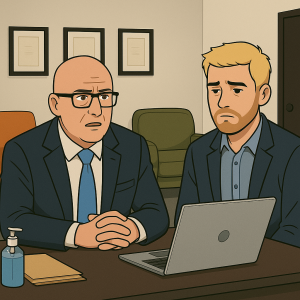1. Victim and Witness Rights
- Office of Victim Services (OVS)
Provides financial compensation, victim advocates, and assistance with protective orders and court navigation. - Office of the Victim Advocate (OVA)
An independent agency ensuring that crime victims are treated with fairness and respect throughout the criminal justice process.
2. Free and Low-Cost Legal Aid Programs
- Connecticut Legal Help
Offers free civil legal aid for low-income individuals, including domestic violence, stalking, and harassment cases. - Statewide Legal Services of Connecticut
Provides free legal advice, referrals, and self-help materials to those who qualify.
3. Relevant Laws
- Stalking: Conn. Gen. Stat. § 53a-181c through § 53a-181e
What it means: Stalking includes willfully following or lying in wait for another person in a way that causes emotional distress or fear. Includes both first- and second-degree stalking depending on severity. - Harassment: Conn. Gen. Stat. § 53a-183
What it means: Covers abusive, threatening, or alarming communications—by phone, mail, or electronic means—intended to annoy or alarm another person. - Bullying: No adult criminal statute. Governed by Conn. Gen. Stat. § 10-222d (Education Code).
What it means: Connecticut law mandates that school districts adopt policies to address bullying, including cyberbullying. Incidents may lead to suspension or referral to juvenile court. - Defamation: Civil tort, not criminal. Governed by Connecticut common law and case law.
What it means: Victims can sue for libel (written) or slander (spoken) when false statements cause reputational harm. No criminal defamation law exists in the state.
4. Reporting and Hotlines
- Call 911 in an emergency or if immediate harm is present.
- Report non-emergency incidents to your local police or school administrators.
- Connecticut Coalition Against Domestic Violence (CCADV)
Connects survivors with emergency shelter, legal support, and court advocates across the state. - Statewide Domestic Violence Hotline: 1-888-774-2900
Operates 24/7 and provides confidential help statewide.
5. Support Organizations
- Connecticut Coalition Against Domestic Violence (CCADV)
Leads statewide advocacy, training, and direct services for domestic violence survivors. - The Center for Family Justice
Offers crisis intervention, shelter, legal assistance, and trauma-informed care in Bridgeport and surrounding areas.
6. Civil Remedies and Protection Orders
Connecticut offers civil protection orders through both family and criminal courts. These include restraining orders, protective orders, and civil protection orders for victims of stalking, harassment, or sexual assault. Legal aid programs and court advocates can help with filing and representation.
Important Note on Jurisdiction: If the individual you are seeking a restraining order against lives in a different state, your local court may not have jurisdiction to enforce that order. In most cases, you must file for protection in the state where that individual resides or where the conduct occurred. This applies even in situations involving online harassment, defamation, or stalking. Contact legal aid services in both your state and the other person’s state for guidance.
7. Youth and School Resources
- Connecticut Department of Education – Bullying Prevention
Includes school district policies, complaint procedures, and state-level oversight of bullying incidents.
8. Court Forms and Filing Help
- Connecticut Judicial Branch – Personal Safety Forms
Offers downloadable forms for restraining orders, civil protection orders, and harassment complaints.
9. Online Safety and Privacy Tools
- NNEDV Tech Safety Toolkit
Provides guidance for protecting against cyberstalking, image abuse, and digital harassment.
Disclaimer: This information is provided for educational purposes only and does not constitute legal advice.




